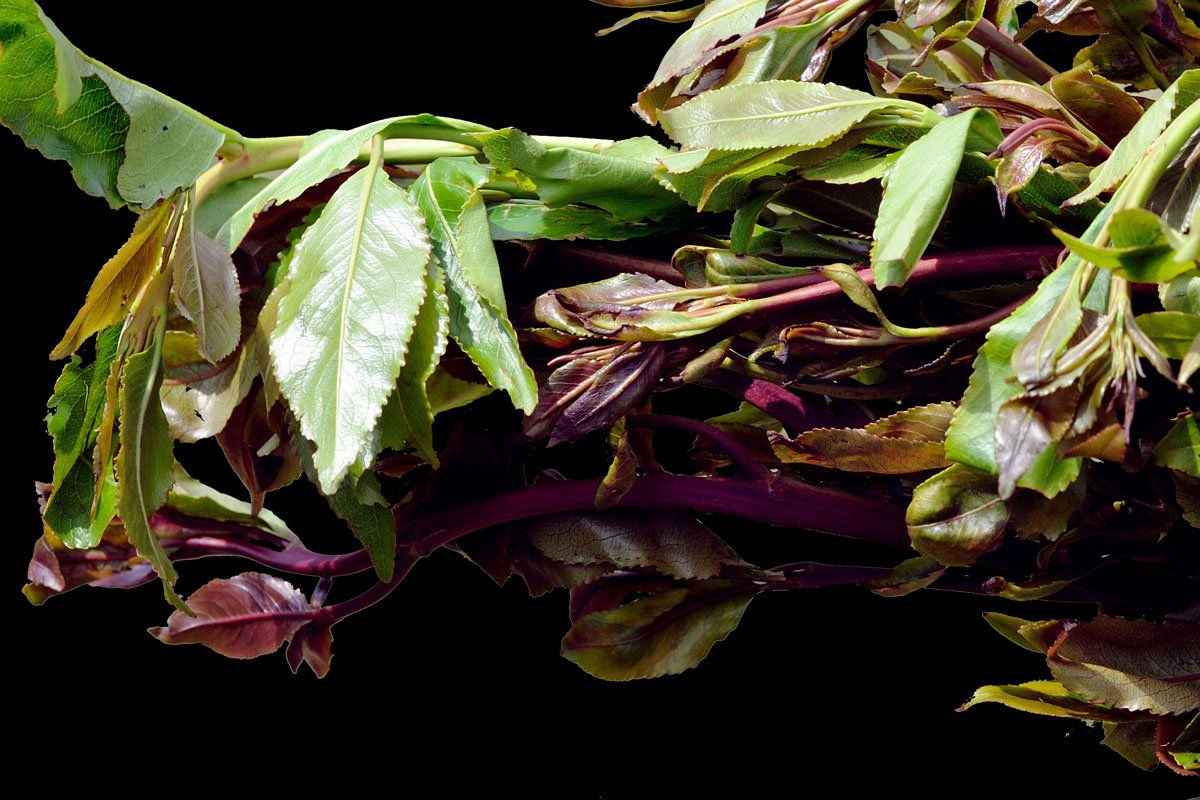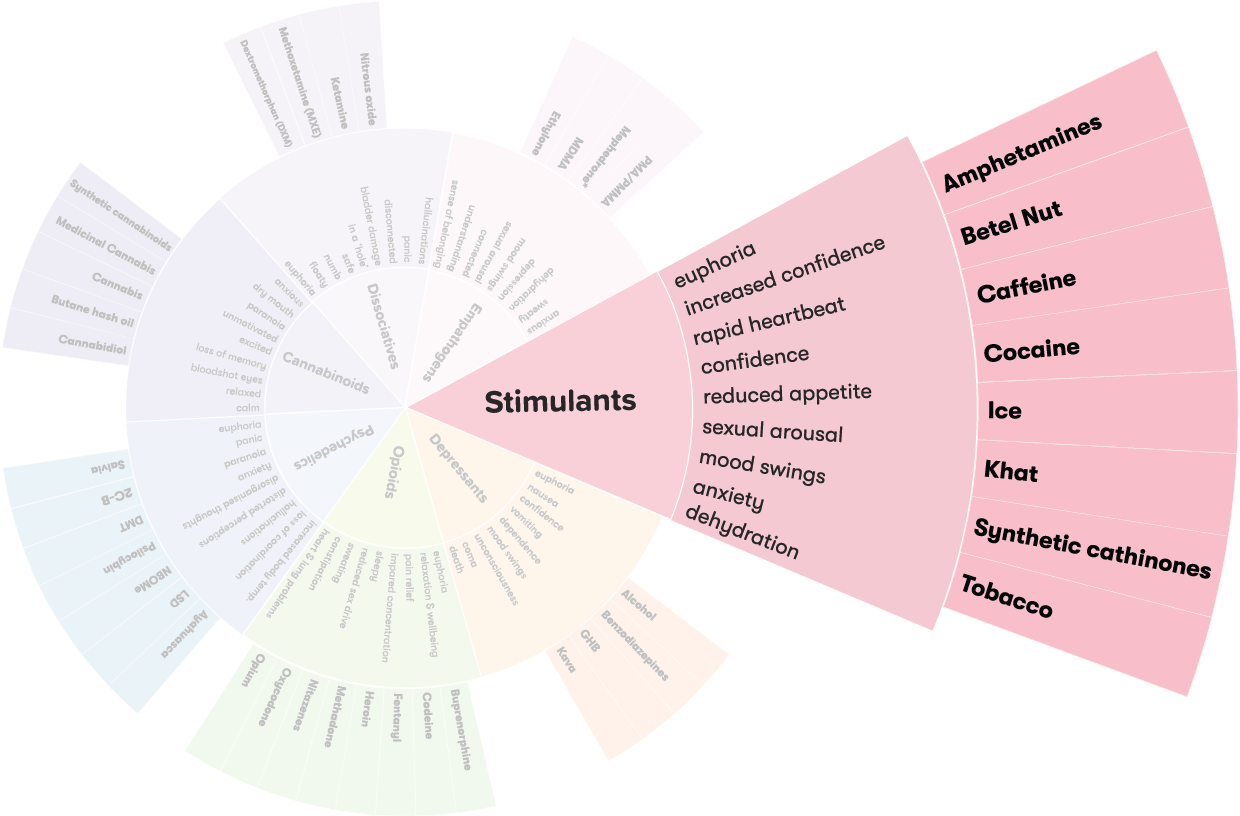How is it used?
Khat leaves and buds can be chewed fresh, but may also be preserved by wrapping freshly picked khat in banana leaves, and then used dried.1
Effects of khat
Use of any drug can have risks. It’s important to be careful when taking any type of drug.
Khat affects everyone differently, based on:
- size, weight and health
- whether the person is used to taking it
- whether other drugs are taken around the same time
- the amount taken.
Short term effects may include:
- increased talkativeness
- feeling energetic and social
- alertness and improved concentration
- faster heartbeat and breathing
- slightly higher temperature and blood pressure
- reduced appetite.1-3
The effects of khat start approximately 1 hour after chewing and last for around 3 and a half hours.4
Coming down
The comedown effects of khat can last around 24 hours and include:
- restlessness
- Irritability
- low mood5
Khat and mental health
Using khat is associated with mental health conditions such as psychosis which is similar to amphetamine psychosis. It has also been associated with depression, mood swings and violent behaviour.6
Tolerance and dependence
People who regularly use khat can become psychologically dependent on the drug. They may feel they need khat to go about their normal activities like working, studying and socialising, or just to get through the day.7
Long-term effects
Regular use of khat may eventually cause:
- worsening of existing mental health problems
- sleep-related issues
- liver disease
- fertility problems, such as impotence and lower sperm count
- digestive problems such as constipation
- sore, inflamed mouth
- psychological dependence
- mouth cancer.1-3
Withdrawal
Khat appears to pose a relatively low risk for dependence, but withdrawal symptoms may be experienced if someone stops using khat after they have been using it regularly.
Symptoms may include:
- mild depression
- lower blood pressure
- tiredness.1, 2
Mixing khat with other drugs
The effects of taking khat with other drugs − including over-the-counter or prescribed medications − can be unpredictable and dangerous.
According to anecdotal user reports:
- Khat + tobacco = increases the risk of harms caused by smoking
- Khat + alcohol = can cause liver injury
- Khat + stimulants like cocaine and amphetamine = increases the risk of over-heating and heart attack.8
Use of more than one drug or type of drug consumed at the same time is called polydrug use.9
More on Polydrug use
Polydrug use is a term for the use of more than one drug or type of drug at the same time or one after another. Polydrug use can involve both illicit drugs and legal substances, such as alcohol and medications.
Reducing harm
- avoid chewing one bunch after another
- have a break between sessions
- try to eat regular, nutritious foods
- try to get a good night’s sleep
- wash the khat before use to remove any pesticides.8
Getting help
If your use of Khat is affecting your health, family, relationships, work, school, financial or other life situations, or you’re concerned about someone else, you can find help and support.
Call the National Alcohol and Other Drug Hotline on 1800 250 015 for free and confidential advice, information and counselling about alcohol and other drugs
Help and Support Services search
Find a service in your local area from our list. Simply add your location or postcode and filter by service type to quickly discover help near you.
If you're looking for other information or support options, send us an email at druginfo@adf.org.au
Path2Help
Not sure what you are looking for?
Try our intuitive Path2Help tool and be matched with support information and services tailored to you.

It is illegal to import khat into Australia for personal use. For more information visit Australian Government’s Department of Health website.
See also, drugs and the law.
It is not known how much khat is used in Australia.
- Jerah A, Bidwai A, Alam M. A review of the history, cultivation, chemistry, pharmacology and adverse health effects of khat. International Journal of Applied and Natural Sciences. 2017;6(3):2319-4022.
- Al-Juhaishi T, Al-Kindi S, Gehani A. Khat: A widely used drug of abuse in the Horn of Africa and the Arabian Peninsula: Review of literature. Qatar Medical Journal. 2012;2:1-6.
- Basker G. A review of the hazards of khat chewing. International Journal of Pharmacy and Pharmaceutical Sciences. 2013;5:74-7.
- European Monitoring Centre for Drugs and Drug Addiction. Khat Drug Profile. n.d.
- Center NDI. Khat fast facts n.d. cited: September 2022].
- Edwards B Atkins N. Exploring the association between khat use and psychiatric symptoms: a systematic review British Medical Journal Open 2022.
- Miller P. Principles of Addiction 2013 [cited September 2022]. [cited September 2022].
- Drug Science. Cathinone (khat) 2022 cited: September 2022].
- Darke S, Lappin J, Farrell M. The Clinician's Guide to Illicit Drugs. United Kingdom: Silverback Publishing 2019.
- World Health Organization.Lexicon of alcohol and drug terms 2021 [19.03.2021].

